Burt A. The Evolution of the British Empire and Commonwealth From the American Revolution
Подождите немного. Документ загружается.

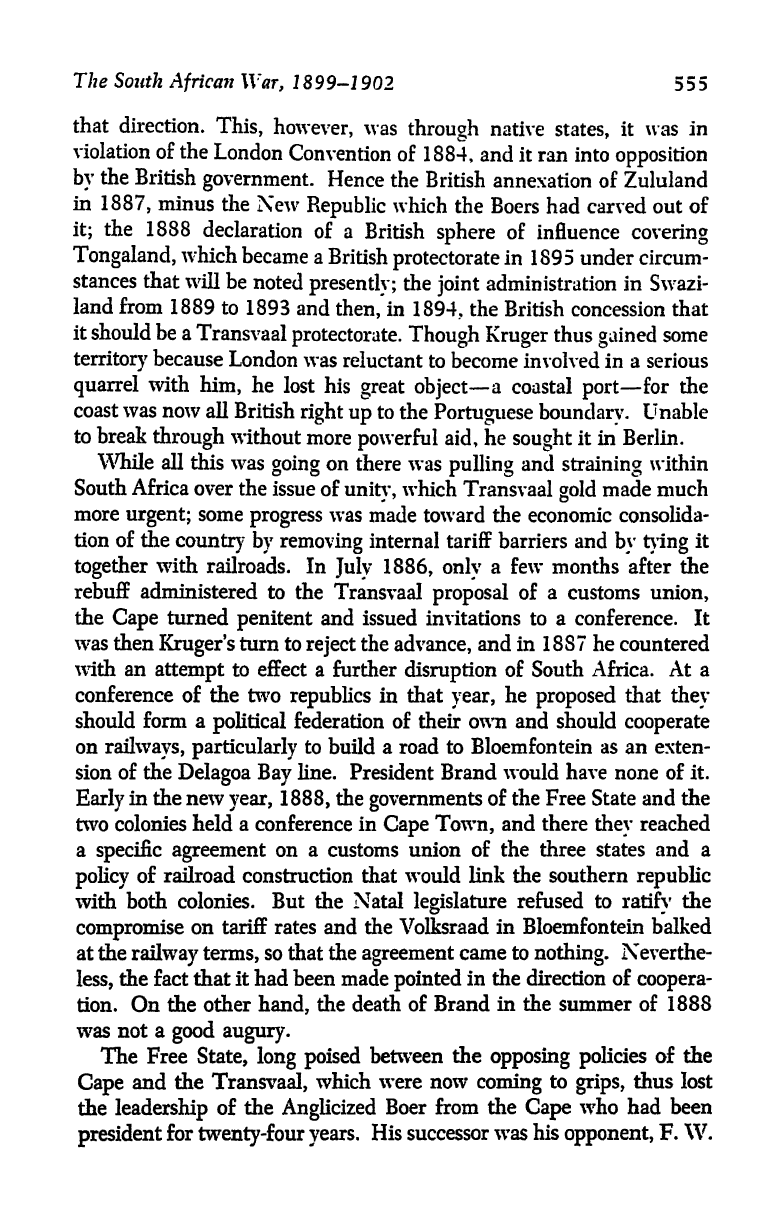
The South
African
\Var,
1
8 9
9-1
902
555
that direction.
This,
however,
was
through
native
states,
it
was
in
violation of the
London
Convention
of
1884,
and
it ran
into
opposition
by
the
British
government.
Hence
the British
annexation of Zululand
in
1887,
minus the
New
Republic
which
the Boers
had carved
out of
it;
the
1888
declaration
of a
British
sphere
of influence
covering
Tongaland,
which
became
a
British
protectorate
in 1895 under circum-
stances
that
will
be
noted
presently;
the
joint
administration
in
Swazi-
land from
1889
to
1893
and
then,'
in
1894,
the
British concession
that
it should
be a
Transvaal
protectorate.
Though Kruger
thus
gained
some
territory
because
London
was
reluctant to
become
involved
in
a serious
quarrel
with
him,
he
lost
his
great object
a
coastal
port
for
the
coast was now
all
British
right
up
to
the
Portuguese boundary.
Unable
to break
through
without
more
powerful
aid,
he
sought
it in Berlin.
While
all
this
was
going
on
there
was
pulling
and
straining
within
South
Africa
over
the
issue
of
unity,
which Transvaal
gold
made much
more
urgent;
some
progress
was
made toward the
economic consolida-
tion of the
country
by
removing
internal
tariff
barriers and
by
tying
it
together
with
railroads.
In
July
1886,
only
a
few months
after
the
rebuff
administered to
the
Transvaal
proposal
of
a
customs
union,
the
Cape
turned
penitent
and
issued
invitations to a
conference.
It
w-as then
Kruger's
turn to
reject
the
advance,
and in 1887 he countered
with an
attempt
to
effect
a further
disruption
of
South
Africa.
At
a
conference
of
the
two
republics
in
that
year,
he
proposed
that
they
should
form a
political
federation
of
their
own
and
should
cooperate
on
railways,
particularly
to build
a
road
to
Bloemfontein
as
an
exten-
sion
of the
Delagoa
Bay
line.
President
Brand
would
have
none of it.
Early
in
the new
year,
1888,
the
governments
of the
Free
State and the
two colonies
held
a
conference
in
Cape
Town,
and there
they
reached
a
specific
agreement
on
a
customs
union of
the three states and a
policy
of
railroad
construction
that
would
link the
southern
republic
with
both colonies. But the
Natal
legislature
refused to
ratify
the
compromise
on
tariff rates and the Volksraad
in
Bloemfontein
balked
at the
railway
terms,
so
that
the
agreement
came to
nothing.
Neverthe-
less,
the fact that
it
had been made
pointed
in the direction of
coopera-
tion. On
the other
hand,
the
death
of Brand
in the
summer of
1888
was not
a
good
augury.
The Free
State,
long
poised
between
the
opposing
policies
of the
Cape
and
the
Transvaal,
which were now
coming
to
grips,
thus
lost
the
leadership
of
the
Anglicized
Boer from the
Cape
who had
been
president
for
twenty-four years.
His
successor
was
his
opponent,
F.
W.
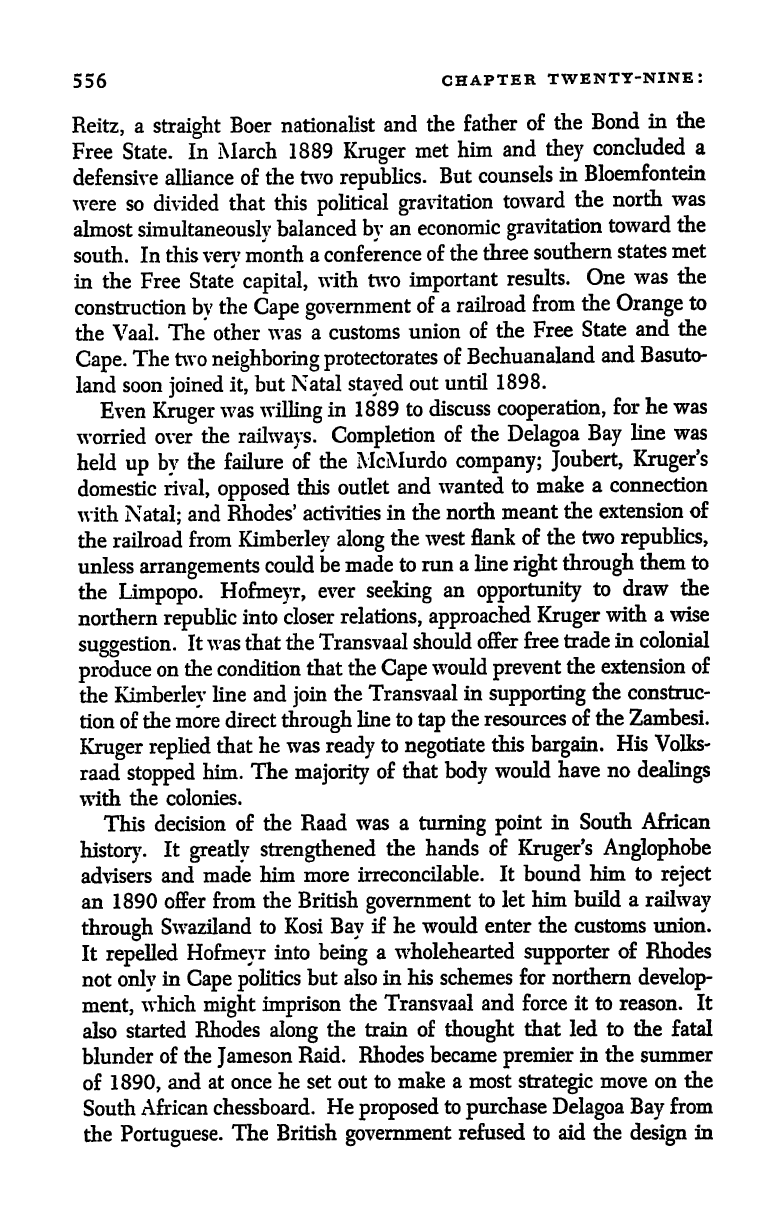
556
CHAPTER
TWENTY-NINE:
Reitz,
a
straight
Boer
nationalist
and the
father
of
the
Bond
in the
Free
State.
In
March
1889
Kruger
met
him
and
they
concluded
a
defensive alliance
of
the
two
republics.
But counsels
in
Bloemfontein
were so divided
that
this
political
gravitation
toward
the
north
was
almost
simultaneously
balanced
by
an economic
gravitation
toward
the
south. In
this
very
month
a
conference
of the
three
southern
states
met
in the
Free
State
capital,
with
two
important
results.
One
was
the
construction
by
the
Cape government
of
a railroad
from
the
Orange
to
the Vaal.
The other
was
a customs
union
of
the
Free
State
and
the
Cape.
The two
neighboring
protectorates
of
Bechuanaland
and
Basuto-
land
soon
joined
it,
but
Natal
stayed
out
until
1898.
Even
Kruger
was
willing
in 1889
to
discuss
cooperation,
for
he was
worried
over
the
railways.
Completion
of
the
Delagoa
Bay
line
was
held
up
by
the failure
of
the
McMuido
company;
Joubert,
Kruger's
domestic
rival,
opposed
this
outlet
and
wanted
to
make
a connection
with
Natal;
and
Rhodes'
activities
in
the
north
meant
the extension
of
the
railroad
from
Kimberley
along
the
west
flank
of the
two
republics,
unless
arrangements
could
be
made to
run
a
line
right
through
them
to
the
Limpopo.
Hofmeyr,
ever
seeking
an
opportunity
to
draw
the
northern
republic
into
closer
relations,
approached
Kruger
with a wise
suggestion.
It
was
that the
Transvaal
should
offer
free
trade
in
colonial
produce
on
the
condition
that
the
Cape
would
prevent
the
extension of
the
Kimberley
line
and
join
the
Transvaal
in
supporting
the construc-
tion
of the
more
direct
through
line
to
tap
the resources
of
the Zambesi.
Kruger
replied
that
he
was
ready
to
negotiate
this
bargain.
His Volks-
raad
stopped
him. The
majority
of
that
body
would
have no
dealings
with
the
colonies.
This decision
of
the
Raad
was a
turning
point
in South
African
history.
It
greatly
strengthened
the
hands
of
Kruger's
Anglophobe
advisers
and made
him more
irreconcilable.
It
bound
him
to
reject
an 1890
offer
from
the
British
government
to
let
him build
a
railway
through
Swaziland
to Kosi
Bay
if
he would
enter the
customs union.
It
repelled
Hofmeyr
into
being
a
wholehearted
supporter
of Rhodes
not
only
in
Cape
politics
but
also in his schemes
for northern
develop-
ment,
which
might
imprison
the
Transvaal and force
it
to
reason.
It
also
started
Rhodes
along
the
train of
thought
that led to
the fatal
blunder
of
the
Jameson
Raid. Rhodes
became
premier
in the
summer
of
1890,
and
at
once
he
set out
to
make a
most
strategic
move on
the
South
African
chessboard.
He
proposed
to
purchase
Delagoa
Bay
from
the
Portuguese.
The British
government
refused to aid the
design
in
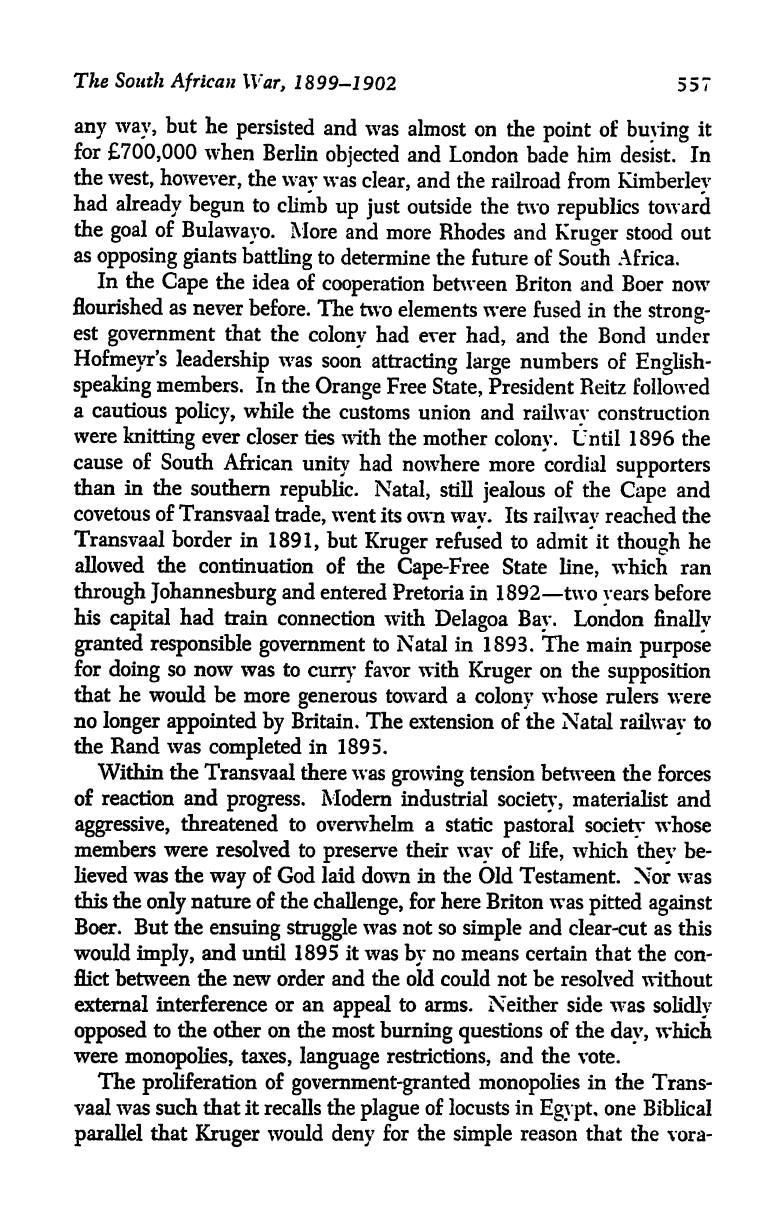
The
South
African War,
1
8
99-1
902
557
any
way,
but
he
persisted
and
was
almost on
the
point
of
buying
it
for
700,000
when
Berlin
objected
and London
bade
him
desist.
In
the
west,
however,
the
way
was
clear,
and
the
railroad
from
Kimberley
had
already
begun
to
climb
up
just
outside the
two
republics
toward
the
goal
of
Bulawayo.
More
and more
Rhodes and
Kruger
stood
out
as
opposing
giants
battling
to
determine
the future
of South Africa.
In the
Cape
the
idea
of
cooperation
between Briton and Boer now
flourished as
never
before.
The
two
elements were
fused in the
strong-
est
government
that
the
colony
had ever
had,
and
the Bond under
Hofmeyr's
leadership
was
soon
attracting
large
numbers of
English-
speaking
members.
In
the
Orange
Free
State,
President Reitz followed
a
cautious
policy,
while
the
customs union
and
railway
construction
were
knitting
ever
closer
ties with
the mother
colony.
Until 1896 the
cause of
South
African
unity
had
nowhere
more cordial
supporters
than
in the
southern
republic.
Natal,
still
jealous
of the
Cape
and
covetous of
Transvaal
trade,
went
its
own
way.
Its
railway
reached the
Transvaal
border in
1891,
but
Kruger
refused to admit
it
though
he
allowed
the
continuation
of the
Cape-Free
State
line,
which ran
through
Johannesburg
and
entered
Pretoria in 1892 two
years
before
his
capital
had train
connection with
Delagoa Bay.
London
finally
granted
responsible
government
to Natal in 1893.
The main
purpose
for
doing
so
now
was to
curry
favor
with
Kruger
on the
supposition
that he
would be
more
generous
toward
a
colony
whose rulers
were
no
longer
appointed
by
Britain.
The
extension
of
the
Natal
railway
to
the
Rand
was
completed
in
1895.
Within the
Transvaal there was
growing
tension
between the
forces
of
reaction
and
progress.
Modern
industrial
society,
materialist and
aggressive,
threatened to
overwhelm
a
static
pastoral
society
whose
members were resolved
to
preserve
their
way
of
life,
w
r
hich
they
be-
lieved was
the
way
of God laid down in
the Old
Testament. Nor
was
this the
only
nature
of the
challenge,
for
here
Briton was
pitted
against
Boer.
But the
ensuing struggle
was not
so
simple
and clear-cut as
this
would
imply,
and until 1895
it
was
by
no means certain
that
the
con-
flict
between the
new
order and
the
old could not
be resolved
without
external interference or an
appeal
to arms. Neither
side
was
solidly
opposed
to
the
other
on
the
most
burning questions
of the
day,
which
were
monopolies,
taxes,
language
restrictions,
and
the
vote.
The
proliferation
of
government-granted monopolies
in
the
Trans-
vaal was such that
it
recalls the
plague
of locusts
in
Egypt,
one
Biblical
parallel
that
Kruger
would
deny
for
the
simple
reason
that
the
vora-
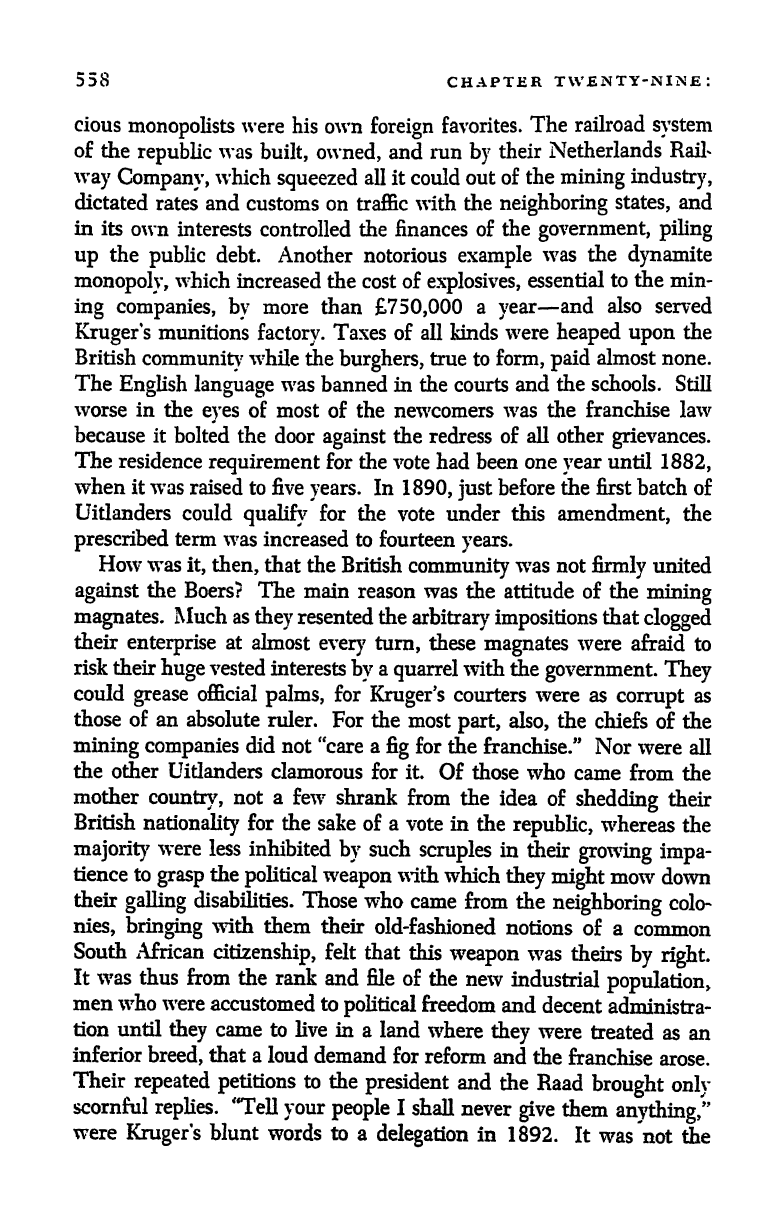
558
CHAPTER
TWENTY-NINE:
cious
monopolists
were
his own
foreign
favorites.
The
railroad
system
of
the
republic
was
built,
owned,
and
run
by
their
Netherlands
Rail*
way
Company,
which
squeezed
all
it could
out of
the
mining
industry,
dictated
rates
and customs on traffic with
the
neighboring
states,
and
in
its
own
interests
controlled
the finances of
the
government,
piling
up
the
public
debt.
Another
notorious
example
was
the
dynamite
monopoly,
which
increased the
cost
of
explosives,
essential
to the min-
ing
companies,
by
more than
750,000
a
year
and
also
served
Kruger's
munitions
factory.
Taxes of all kinds
were
heaped
upon
the
British
community
while
die
burghers,
true
to
form,
paid
almost none.
The
English
language
was banned in the courts
and
the
schools. Still
worse
in
the
eyes
of
most
of
the
newcomers
was
the
franchise
law
because it
bolted
the door
against
the
redress
of all
other
grievances.
The
residence
requirement
for
the
vote
had been one
year
until
1882,
when
it
was
raised
to
five
years.
In
1890,
just
before
the
first
batch
of
Uitlanders
could
qualify
for the
vote under this
amendment,
the
prescribed
term
was
increased
to
fourteen
years.
How
was
it, then,
that
the
British
community
was
not
firmly
united
against
the
Boers? The
main reason
was
the attitude
of
the
mining
magnates.
Much
as
they
resented
the
arbitrary impositions
that
clogged
their
enterprise
at
almost
every
turn,
these
magnates
were
afraid
to
risk their
huge
vested
interests
by
a
quarrel
with
the
government.
They
could
grease
official
palms,
for
Kruger's
courters were
as
corrupt
as
those of
an
absolute ruler.
For the
most
part,
also,
the
chiefs
of the
mining
companies
did not "care a
fig
for
the
franchise."
Nor
were
all
the
other Uitlanders
clamorous
for it.
Of those who
came
from the
mother
country,
not
a
few
shrank
from
the
idea
of
shedding
their
British
nationality
for
the sake
of
a
vote in
the
republic,
whereas the
majority
were
less
inhibited
by
such
scruples
in
their
growing impa-
tience to
grasp
the
political
weapon
with
which
they
might
mow
down
their
galling
disabilities.
Those
who
came
from the
neighboring
colo-
nies,
bringing
with
them
their
old-fashioned
notions
of
a
common
South African
citizenship,
felt that
this
weapon
was
theirs
by
right.
It
was thus
from
the rank
and file
of
the
new
industrial
population,
men who were
accustomed
to
political
freedom
and
decent
administra-
tion until
they
came
to
live
in
a
land
where
they
were
treated
as
an
inferior
breed,
that
a
loud
demand for
reform
and
the
franchise
arose.
Their
repeated
petitions
to the
president
and
the
Raad
brought
only
scornful
replies.
"Tell
your
people
I
shall
never
give
them
anything/'
were
Kruger's
blunt
words
to a
delegation
in
1892.
It
was
not
the
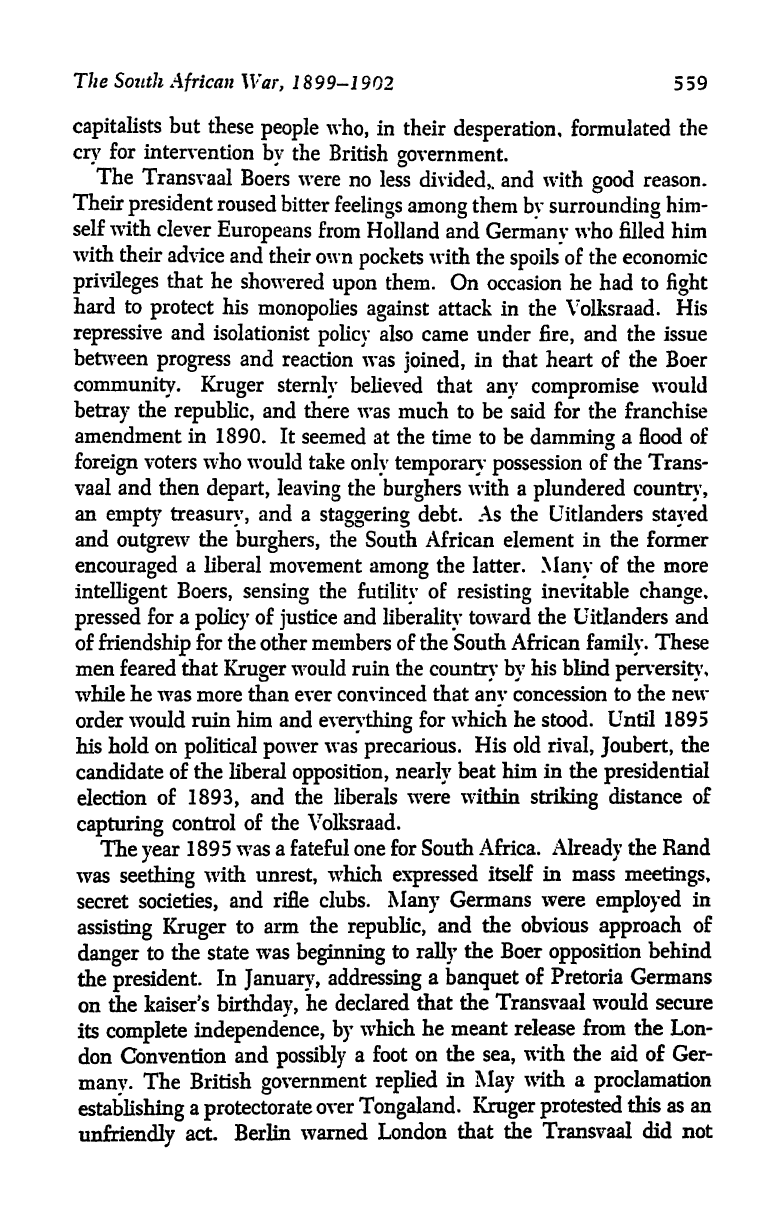
The
South
African War,
1
8
99-
J
902
559
capitalists
but
these
people
who,
in their
desperation,
formulated
the
cry
for
intervention
by
the
British
government.
The
Transvaal
Boers
were
no
less
divided,,
and
with
good
reason.
Their
president
roused
bitter
feelings among
them
by
surrounding
him-
self
with
clever
Europeans
from
Holland and
Germany
who filled
him
with
their
advice
and their
own
pockets
with the
spoils
of
the economic
privileges
that
he
showered
upon
them.
On
occasion
he had
to
fight
hard to
protect
his
monopolies
against
attack in the
Volksraad.
His
repressive
and
isolationist
policy
also came under
fire,
and the issue
between
progress
and
reaction was
joined,
in
that
heart
of
the Boer
community.
Kruger
sternly
believed
that
any
compromise
would
betray
the
republic,
and there
was much
to be said for
the
franchise
amendment
in
1890. It
seemed
at the time
to be
damming
a flood of
foreign
voters who
would take
only temporary possession
of
the
Trans-
vaal and
then
depart,
leaving
the
burghers
with a
plundered
country,
an
empty treasury,
and a
staggering
debt.
As
the LJitlanders
stayed
and
outgrew
the
burghers,
the
South
African
element
in the
former
encouraged
a
liberal
movement
among
the
latter.
Many
of the more
intelligent
Boers,
sensing
the
futility
of
resisting
inevitable
change,
pressed
for
a
policy
of
justice
and
liberality
toward
the
Uitlanders
and
of
friendship
for the
other members
of the
South
African
family.
These
men feared that
Kruger
would
ruin
the
country
by
his
blind
perversity,
while he
was
more
than
ever convinced
that
any
concession
to
the
new
order
would
ruin
him
and
everything
for
which he
stood.
Until 1895
his
hold on
political power
was
precarious.
His old
rival,
Joubert,
the
candidate
of the
liberal
opposition,
nearly
beat
him in
the
presidential
election
of
1893,
and
the
liberals
were within
striking
distance
of
capturing
control
of
the Volksraad.
The
year
1895
was
a fateful one for
South
Africa.
Already
the
Rand
was
seething
with
unrest,
which
expressed
itself
in mass
meetings,
secret
societies,
and
rifle clubs.
Many
Germans
were
employed
in
assisting
Kruger
to
arm
the
republic,
and
the
obvious
approach
of
danger
to
the
state
was
beginning
to
rally
the Boer
opposition
behind
the
president.
In
January, addressing
a
banquet
of Pretoria Germans
on
the kaiser's
birthday,
he declared
that the
Transvaal
would
secure
its
complete
independence,
by
which
he
meant
release from
the
Lon-
don
Convention
and
possibly
a
foot
on
the
sea,
with
the
aid of Ger-
many.
The
British
government
replied
in
May
with
a
proclamation
establishing
a
protectorate
over
Tongaland.
Kruger protested
this
as an
unfriendly
act.
Berlin
warned
London
that
the
Transvaal did not
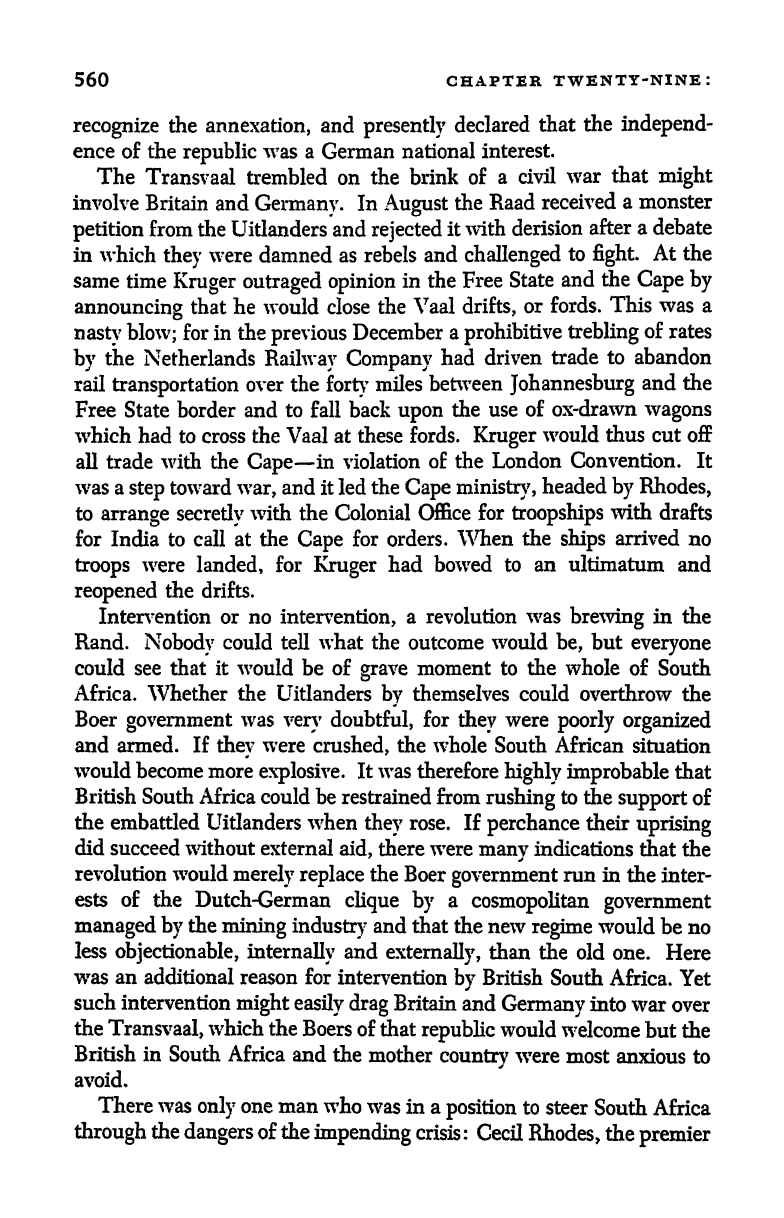
560
CHAPTER
TWENTY-NINE:
recognize
the
annexation,
and
presently
declared
that
the
independ-
ence
of the
republic
was a
German
national
interest.
The
Transvaal trembled on
the
brink
of
a civil
war
that
might
involve
Britain and
Germany.
In
August
the
Raad
received
a monster
petition
from the
Uitlanders and
rejected
it
with derision
after
a
debate
in
which
they
were
damned
as rebels
and
challenged
to
fight.
At the
same time
Kruger outraged
opinion
in the
Free
State
and
the
Cape
by
announcing
that he
would
close
the Vaal
drifts,
or
fords.
This
was
a
nasty
blow;
for
in the
previous
December
a
prohibitive
trebling
of
rates
by
the
Netherlands
Railway
Company
had
driven
trade
to
abandon
rail
transportation
over
the
fort)'
miles
between
Johannesburg
and the
Free
State
border
and
to
fall back
upon
the
use of
ox-drawn
wagons
which
had to
cross the Vaal
at these fords.
Kruger
would
thus cut
off
all trade with
the
Cape
in violation
of the London
Convention. It
was a
step
toward
war,
and it led
the
Cape
ministry,
headed
by
Rhodes,
to
arrange
secretly
with the
Colonial
Office
for
troopships
with
drafts
for India
to
call
at the
Cape
for orders.
When
the
ships
arrived
no
troops
were
landed,
for
Kruger
had
bowed
to an
ultimatum
and
reopened
the drifts.
Intervention or no
intervention,
a revolution
was
brewing
in the
Rand.
Nobody
could
tell what the
outcome
would
be,
but
everyone
could
see that it
would be
of
grave
moment to
the
whole
of
South
Africa. Whether the
Uitlanders
by
themselves could
overthrow the
Boer
government
was
very
doubtful,
for
they
were
poorly
organized
and
armed. If
they
were
crushed,
the whole South African
situation
would
become
more
explosive.
It
was
therefore
highly
improbable
that
British
South
Africa
could
be
restrained
from
rushing
to the
support
of
the
embattled Uitlanders when
they
rose.
If
perchance
their
uprising
did
succeed without external
aid,
there
were
many
indications
that the
revolution
would
merely
replace
the
Boer
government
run
in
the
inter-
ests
of
the
Dutch-German
clique
by
a
cosmopolitan
government
managed
by
the
mining industry
and
that
the new
regime
would be
no
less
objectionable,
internally
and
externally,
than
the
old one.
Here
was
an
additional reason
for
intervention
by
British
South
Africa. Yet
such intervention
might
easily
drag
Britain
and
Germany
into war
over
the
Transvaal,
which
the
Boers of that
republic
would
welcome
but
the
British in South
Africa
and the
mother
country
were
most
anxious
to
avoid.
There
was
only
one
man
who
was
in a
position
to steer
South
Africa
through
the
dangers
of
the
impending
crisis:
Cecil
Rhodes,
the
premier
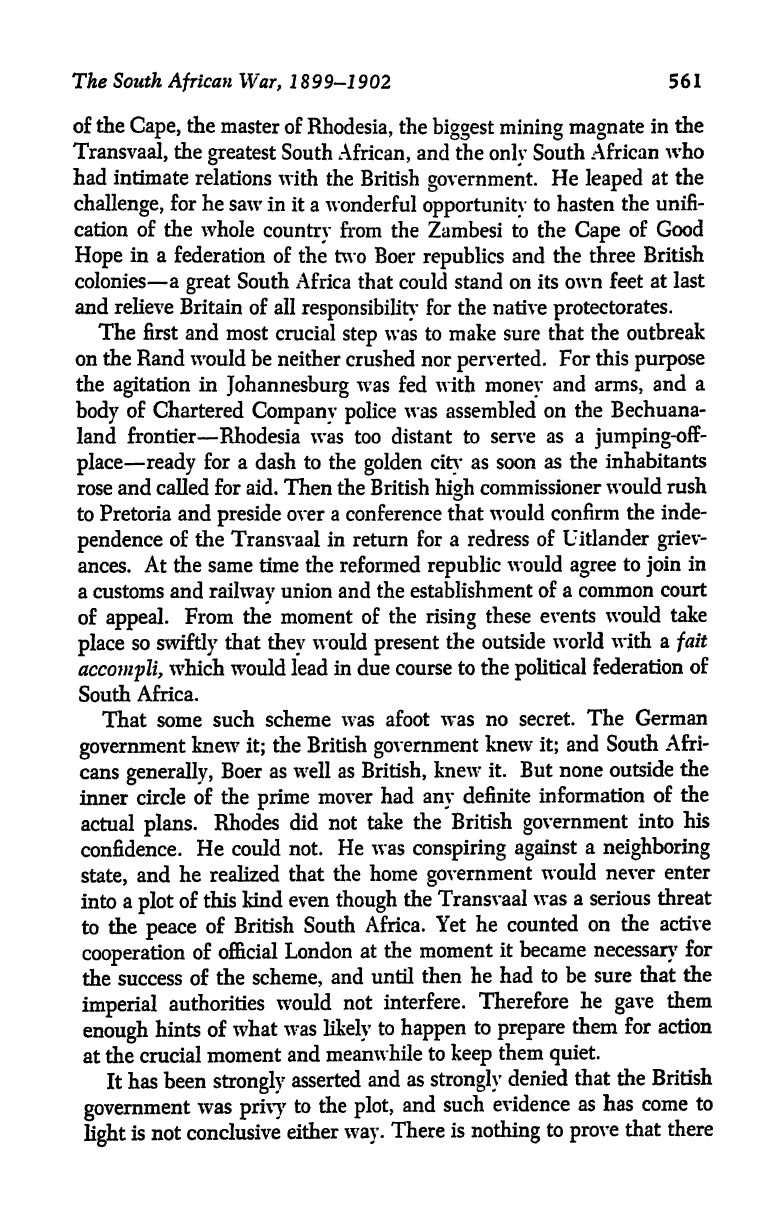
The
South
African
War,
1
899-1
902 561
of
the
Cape,
the
master
of
Rhodesia,
the
biggest
mining
magnate
in
the
Transvaal,
the
greatest
South
African,
and
the
only
South
African
who
had
intimate
relations
with the British
government.
He
leaped
at
the
challenge,
for
he
saw
in it
a wonderful
opportunity
to
hasten
the unifi-
cation of
the
whole
country
from the Zambesi
to
the
Cape
of Good
Hope
in a
federation
of
the two
Boer
republics
and
the three
British
colonies
a
great
South
Africa that
could stand on
its
own feet
at last
and relieve
Britain
of all
responsibility
for the
native
protectorates.
The first and
most
crucial
step
was
to
make sure
that
the
outbreak
on
the
Rand
would be neither
crushed nor
perverted.
For
this
purpose
the
agitation
in
Johannesburg
was fed with
money
and
arms,
and
a
body
of Chartered
Company police
was
assembled
on
the Bechuana-
land
frontier
Rhodesia
was too distant
to
serve as
a
jumping-off-
place
ready
for a
dash to
the
golden
city
as
soon
as
the
inhabitants
rose
and called
for
aid.
Then
the British
high
commissioner
would
rush
to
Pretoria
and
preside
over
a
conference
that would
confirm
the
inde-
pendence
of
the
Transvaal
in return for
a redress
of
Uitlander
griev-
ances. At the
same
time the
reformed
republic
would
agree
to
join
in
a customs
and
railway
union and the
establishment
of a
common
court
of
appeal.
From the
moment
of
the
rising
these
events
would
take
place
so
swiftly
that
they
would
present
the outside
world
with
a
fait
accompli,
which
would lead
in due
course to the
political
federation
of
South
Africa.
That
some
such scheme
was afoot
was no
secret.
The German
government
knew
it;
the
British
government
knew
it;
and South
Afri-
cans
generally,
Boer
as well as
British,
knew
it. But none
outside
the
inner
circle
of the
prime
mover
had
any
definite
information
of
the
actual
plans.
Rhodes
did
not take
the
British
government
into
his
confidence.
He
could
not.
He
was
conspiring against
a
neighboring
state,
and
he
realized
that the
home
government
would
never
enter
into
a
plot
of
this
kind
even
though
the
Transvaal
was
a
serious
threat
to
the
peace
of
British
South
Africa.
Yet he counted
on
the
active
cooperation
of
official
London
at
the moment
it became
necessary
for
the
success
of
the
scheme,
and
until
then
he had
to be
sure
that
the
imperial
authorities
would
not
interfere.
Therefore
he
gave
them
enough
hints
of
what
was
likely
to
happen
to
prepare
them
for
action
at
the
crucial
moment
and
meanwhile
to
keep
them
quiet.
It
has
been
strongly
asserted
and as
strongly
denied
that
the
British
government
was
privy
to the
plot,
and
such
evidence
as
has
come
to
light
is not
conclusive
either
way.
There
is
nothing
to
prove
that
there
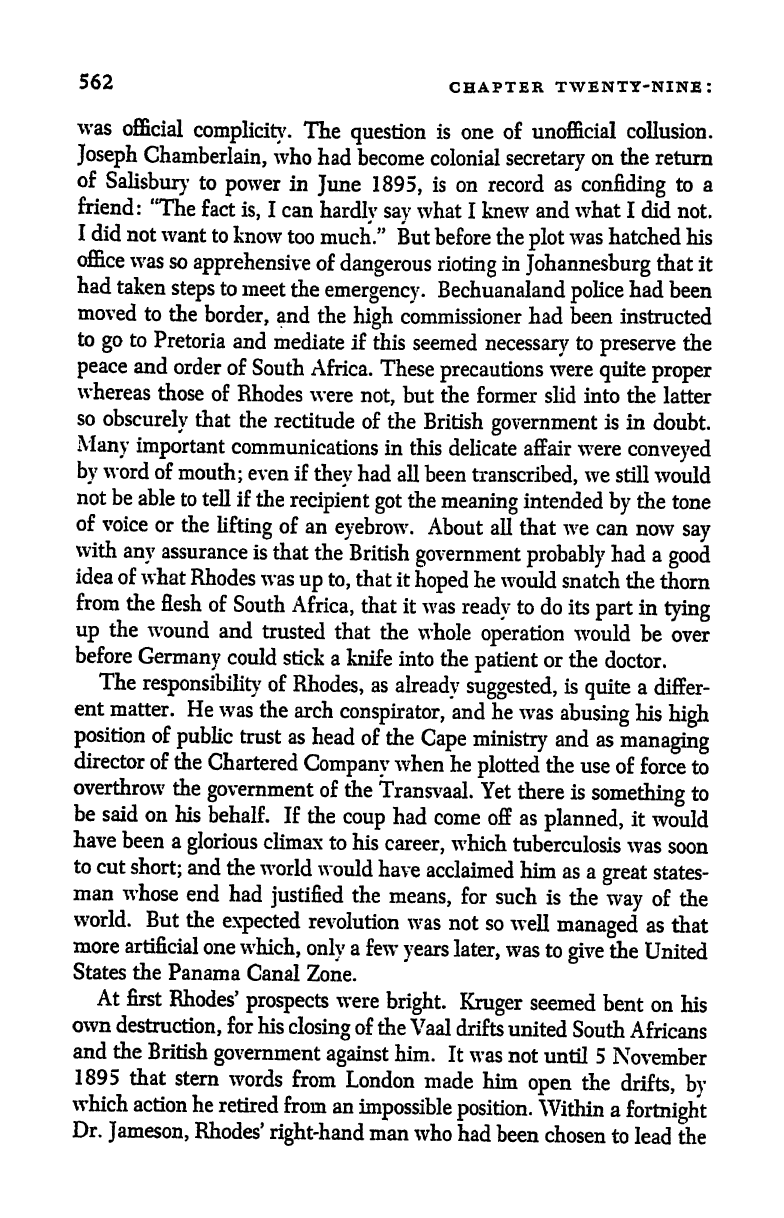
562
CHAPTER
TWENTY-NINE:
was
official
complicity.
The
question
is
one
of
unofficial collusion.
Joseph
Chamberlain,
who
had
become
colonial
secretary
on
the
return
of
Salisbury
to
power
in
June
1895,
is on record
as
confiding
to
a
friend:
"The
fact
is,
I
can
hardly
say
what
I
knew
and
what
I did
not.
I
did
not
want
to
know
too
much."
But
before
the
plot
was
hatched his
office
was
so
apprehensive
of
dangerous
rioting
in
Johannesburg
that
it
had
taken
steps
to
meet
the
emergency.
Bechuanaland
police
had
been
moved
to
the
border,
and
the
high
commissioner had
been
instructed
to
go
to
Pretoria
and
mediate if
this
seemed
necessary
to
preserve
the
peace
and
order
of
South
Africa,
These
precautions
were
quite
proper
whereas
those
of
Rhodes
were
not,
but
the former
slid into
the
latter
so
obscurely
that
the
rectitude
of the
British
government
is in
doubt.
Many
important
communications in this
delicate affair were
conveyed
by
word
of
mouth;
even if
they
had
all
been
transcribed,
we
still
would
not be
able
to tell
if
the
recipient
got
the
meaning
intended
by
the
tone
of
voice
or
the
lifting
of
an
eyebrow.
About all that
we
can
now
say
with
any
assurance
is
that
the
British
government
probably
had
a
good
idea
of
what
Rhodes
was
up
to,
that it
hoped
he
would
snatch
the
thorn
from the
flesh
of
South
Africa,
that
it was
ready
to do its
part
in
tying
up
the
wound
and
trusted
that
the
whole
operation
would
be
over
before
Germany
could
stick a
knife
into
the
patient
or
the
doctor.
The
responsibility
of
Rhodes,
as
already
suggested,
is
quite
a
differ-
ent
matter.
He
was
the
arch
conspirator,
and he
was
abusing
his
high
position
of
public
trust
as
head of the
Cape
ministry
and
as
managing
director
of
the
Chartered
Company
when
he
plotted
the
use
of
force
to
overthrow
the
government
of
the
Transvaal
Yet
there
is
something
to
be
said
on
his
behalf.
If
the
coup
had
come
off
as
planned,
it
would
have
been a
glorious
climax
to
his
career,
which
tuberculosis
was
soon
to
cut
short;
and
the
world
would
have
acclaimed
him
as a
great
states-
man
whose
end
had
justified
the
means,
for
such
is
the
way
of
the
world.
But
the
expected
revolution
was
not
so
well
managed
as
that
more
artificial
one
which,
only
a
few
years
later,
was
to
give
the
United
States
the
Panama
Canal
Zone.
At
first
Rhodes'
prospects
were
bright.
Kruger
seemed
bent
on
his
own
destruction,
for
his
closing
of
the
Vaal
drifts
united
South
Africans
and the
British
government
against
him.
It
was
not
until 5
November
1895 that
stern
words
from
London
made
him
open
the
drifts,
by
which
action he
retired
from
an
impossible
position.
Within
a
fortnight
Dr.
Jameson,
Rhodes'
right-hand
man
who
had
been
chosen
to
lead
the
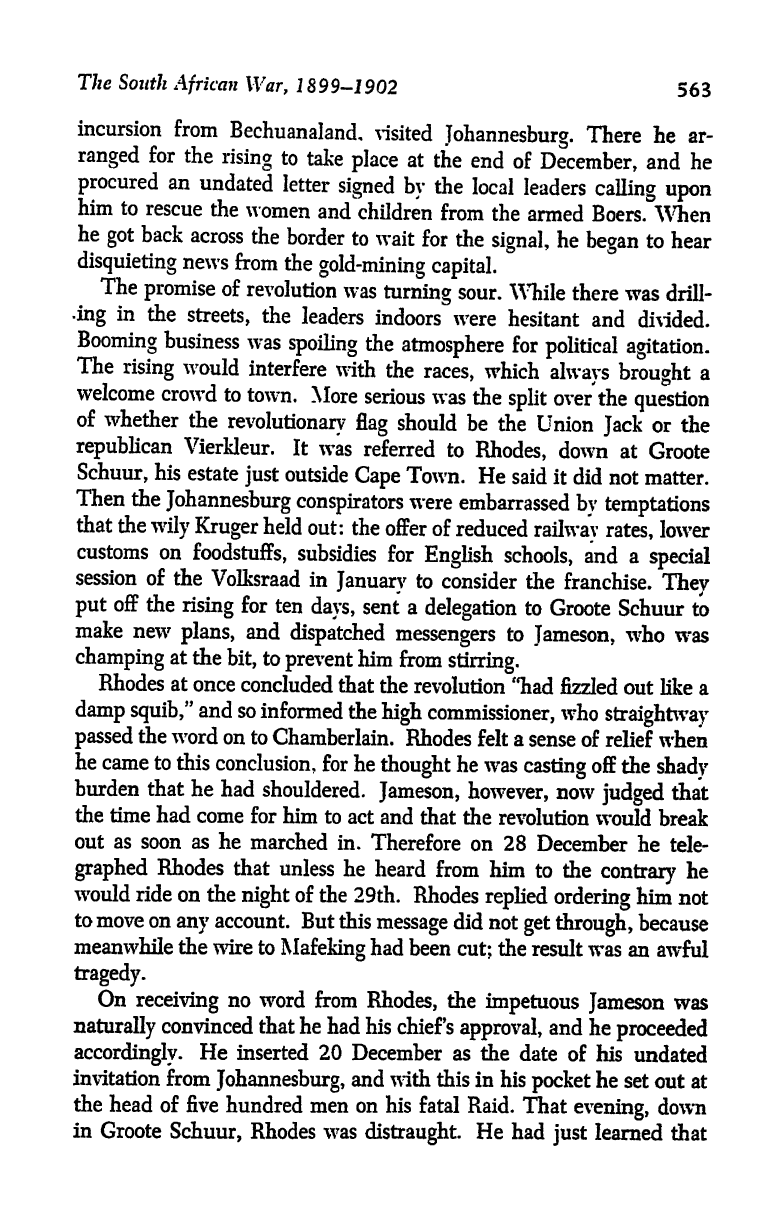
The South
African
War,
1899-1902
563
incursion
from
Bechuanaland,
visited
Johannesburg.
There
he
ar-
ranged
for
the
rising
to
take
place
at
the
end
of
December,
and
he
procured
an
undated
letter
signed
by
the
local
leaders
calling upon
him
to
rescue
the
women
and
children
from
the
armed
Boers.
When
he
got
back
across
the
border
to
wait
for
the
signal,
he
began
to
hear
disquieting
news
from
the
gold-mining capital.
The
promise
of
revolution
was
turning
sour.
While
there
was
drill-
ing
in
the
streets,
the
leaders
indoors
were
hesitant
and
divided.
Booming
business
was
spoiling
the
atmosphere
for
political
agitation.
The
rising
would
interfere
with
the
races,
which
always
brought
a
welcome
crowd
to
town.
More
serious
was
the
split
over
the
question
of
whether
the
revolutionary
flag
should
be
the
Union
Jack
or the
republican
Vierkleur.
It
was
referred
to
Rhodes,
down at
Groote
Schuur,
his
estate
just
outside
Cape
Town.
He
said
it did not
matter.
Then
the
Johannesburg
conspirators
were
embarrassed
by
temptations
that
the
wily
Kruger
held
out:
the
offer of
reduced
railway
rates,
lower
customs
on
foodstuffs,
subsidies
for
English
schools,
and
a
special
session of
the
Volksraad in
January
to
consider the
franchise.
They
put
off
the
rising
for
ten
days,
sent a
delegation
to
Groote
Schuur
to
make
new
plans,
and
dispatched
messengers
to
Jameson,
who was
champing
at
the
bit,
to
prevent
him
from
stirring.
Rhodes
at
once
concluded
that
the
revolution
"had
fizzled
out
like
a
damp
squib,"
and so
informed the
high
commissioner,
who
straightway
passed
the
word
on
to
Chamberlain.
Rhodes
felt
a
sense
of
relief
when
he
came to
this
conclusion,
for he
thought
he
w
?
as
casting
off
the
shady
burden
that
he
had
shouldered.
Jameson,
however,
now
judged
that
the
time
had
come for
him
to
act
and that
the
revolution
would
break
out as
soon as
he
marched in.
Therefore
on
28
December
he
tele-
graphed
Rhodes that
unless
he
heard
from
him
to the
contrary
he
would ride
on the
night
of the
29th.
Rhodes
replied
ordering
him
not
to
move on
any
account.
But
this
message
did not
get
through,
because
meanwhile the wire
to
Mafeking
had been
cut;
the result
was
an
awful
tragedy.
On
receiving
no
word from
Rhodes,
the
impetuous
Jameson
was
naturally
convinced
that he
had his
chiefs
approval,
and
he
proceeded
accordingly.
He
inserted
20
December as the
date
of
his
undated
invitation
from
Johannesburg,
and
with
this in his
pocket
he
set
out at
the
head
of five
hundred
men on
his fatal
Raid.
That
evening,
down
in
Groote
Schuur,
Rhodes
was
distraught.
He
had
just
learned that
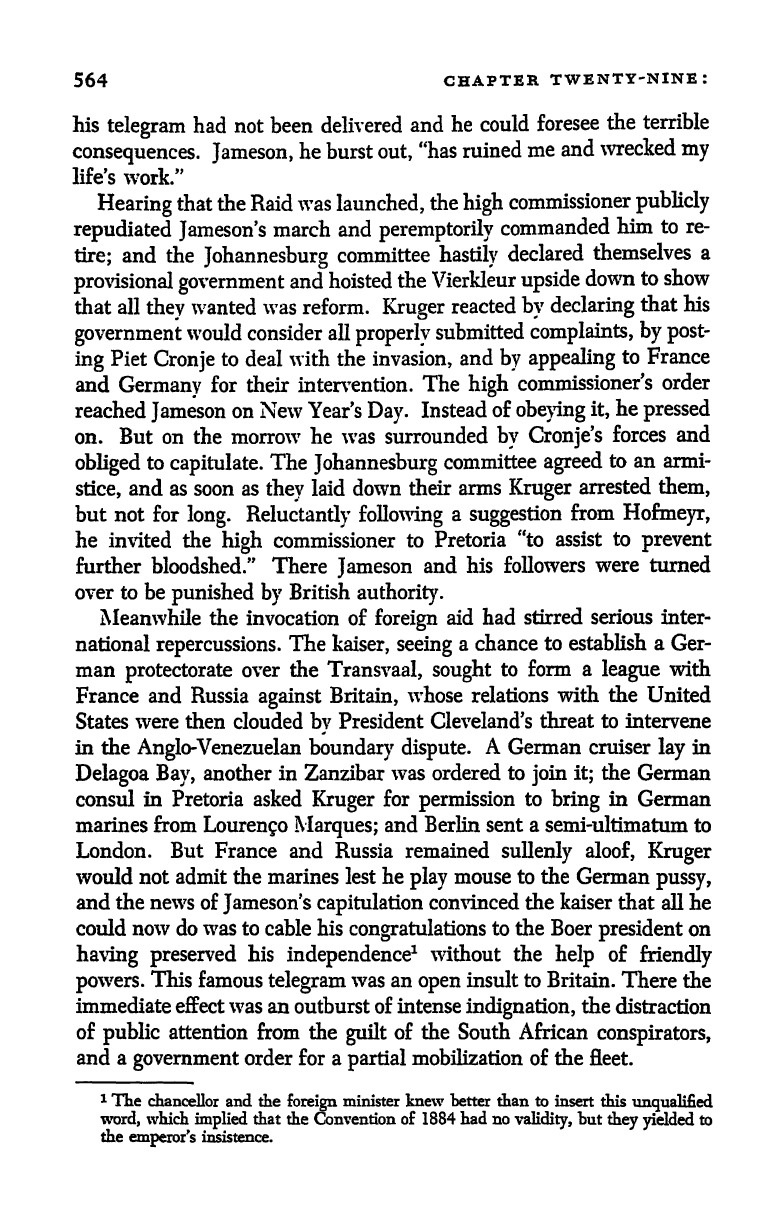
564
CHAPTER
TWENTY-NINE:
his
telegram
had not been
delivered
and
he
could
foresee
the
terrible
consequences.
Jameson,
he
burst
out,
"has
ruined
me
and
wrecked
my
life's
work."
Hearing
that the
Raid
was
launched,
the
high
commissioner
publicly
repudiated
Jameson's
march
and
peremptorily
commanded
him to
re-
tire;
and the
Johannesburg
committee
hastily
declared
themselves
a
provisional
government
and hoisted
the Vierkleur
upside
down
to
show
that all
they
wanted
was
reform.
Kruger
reacted
by
declaring
that his
government
would
consider all
properly
submitted
complaints,
by post-
ing
Piet
Cronje
to deal
with the
invasion,
and
by
appealing
to France
and
Germany
for their
intervention.
The
high
commissioner's
order
reached
Jameson
on
New Year's
Day.
Instead
of
obeying
it,
he
pressed
on. But
on
the
morrow he was surrounded
by
Cronje's
forces
and
obliged
to
capitulate.
The
Johannesburg
committee
agreed
to an armi-
stice,
and as
soon
as
they
laid
down
their
arms
Kruger
arrested
them,
but
not for
long.
Reluctantly
following
a
suggestion
from
Hofmeyr,
he
invited
the
high
commissioner
to Pretoria
"to
assist
to
prevent
further
bloodshed."
There
Jameson
and
his
followers
were
turned
over to
be
punished by
British
authority.
Meanwhile the
invocation
of
foreign
aid had
stirred serious inter-
national
repercussions.
The
kaiser,
seeing
a chance
to establish
a
Ger-
man
protectorate
over the
Transvaal,
sought
to form
a
league
with
France and Russia
against
Britain,
whose relations
with the
United
States
were then
clouded
by
President
Cleveland's
threat
to
intervene
in the
Anglo-Venezuelan
boundary
dispute.
A
German cruiser
lay
in
Delagoa
Bay,
another in
Zanzibar
was ordered to
join
it;
the
German
consul
in Pretoria asked
Kruger
for
permission
to
bring
in
German
marines from
Lourengo
Marques;
and Berlin sent
a
semi-ultimatum to
London.
But
France and Russia remained
sullenly
aloof,
Kruger
would
not
admit
the marines lest
he
play
mouse to
the
German
pussy,
and
the
news
of
Jameson's
capitulation
convinced
the
kaiser
that
all he
could
now
do
was to
cable his
congratulations
to
the Boer
president
on
having
preserved
his
independence
1
without
the
help
of
friendly
powers.
This famous
telegram
was
an
open
insult to Britain.
There
the
immediate
effect
was
an outburst of
intense
indignation,
the
distraction
of
public
attention
from the
guilt
of
the
South African
conspirators,
and
a
government
order for a
partial
mobilization of
the
fleet.
1
The
chancellor and the
foreign
minister knew better than
to insert this
unqualified
word,
which
implied
that
the Convention
of 18S4
had no
validity,
but
they
yielded
to
the
emperor's
insistence.
